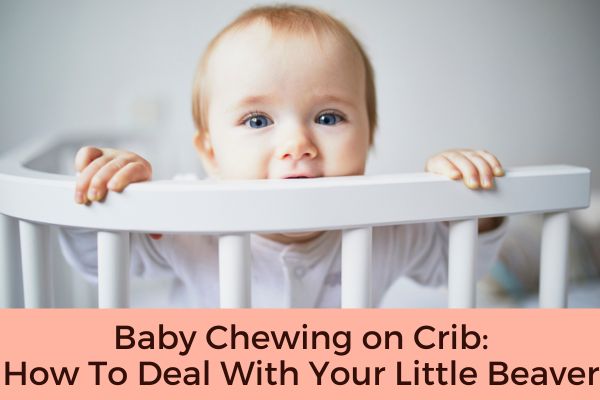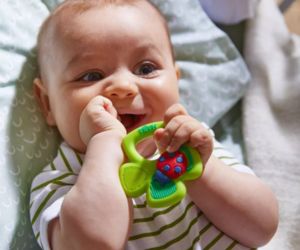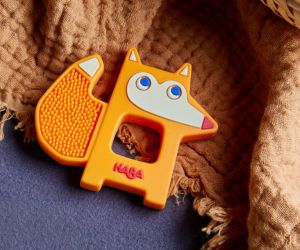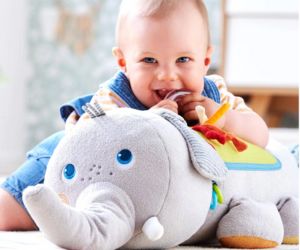My baby chew on her crib. That’s right. She was a fierce little beaver but she turned out fine. She still have her full set of baby teeth at 5 years old (at the time of this article’s publishing). But I digress.
If you’re worried about yours and you also have some “baby chewing on crib” issues, this a perfect article for you. Here, you’ll find some tips on how to stop your little beaver from gnawing their crib, the risks it can create, the last thing you can do to finally stop your baby from chewing their crib (if the methods here don’t work), and more.
Let’s start with the probable reasons why your baby chews on the crib.
I hope you’ll love the products we recommend! Just a quick note: if you click on a product link below and decide to buy it, we may earn a small commission.
List of Contents
How to Stop Babies From Chewing Their Crib
Babies have an innate desire to chew, especially when they’re teething. To redirect this behavior and protect your crib, try implementing the following strategies:
Provide a Teething Toy
When your baby starts gnawing on the crib, offer them a teething toy instead. Teething toys designed specifically for this purpose can provide relief and satisfy their need to chew.
Install a Crib Teething Rail Cover
Protect your crib and your baby’s teeth by installing a crib teething rail cover. These covers are made of baby-safe materials and act as a barrier between your little one’s teeth and the crib rails.
Just take note that it can also have potential risks such as getting untied and wrapping around your baby and such. So use this with caution and carefully, make sure it’s installed properly.
Give a Pacifier
Pacifiers can help satisfy your baby’s oral needs and reduce their urge to chew on the crib. Opt for a pacifier that meets safety standards and is appropriate for your baby’s age.
Provide Infant-Safe Toys
Ensure your baby has a variety of safe, age-appropriate, non-toxic toys to keep them engaged and entertained. This will help divert their attention from the crib and reduce their desire to chew on it.
Distract and Redirect
Whenever you notice your baby attempting to chew on the crib, gently redirect their attention to a more appropriate activity or toy.
Engaging them in interactive play can help shift their focus away from the crib.
Use Positive Reinforcement
Encourage positive behavior by praising and rewarding your baby when they choose to chew on their teething toy or engage with other appropriate items.
Positive reinforcement helps reinforce good habits.
Why Do Babies Chew On Their Cribs?
Here are some common and uncommon reasons why babies chew and bite their cribs:
Teething
One of the main reasons babies chew on their cribs is teething.
Chewing actually helps soothe teething discomfort and aids in the eruption of new teeth.
Exploring Their Environment
Chewing is a natural way for babies to explore their surroundings.
They use their mouths to gather sensory information about different objects, including the crib.
Attention-Seeking
Babies may chew on their cribs to gain attention from their caregivers. If they notice that this behavior leads to interaction, they may continue it as a way to seek attention.
Anxiety or Stress
Excessive chewing on the crib could be a sign of anxiety or stress in your baby.
Chewing can provide comfort and act as a self-soothing mechanism for them.
Boredom
Babies may resort to crib chewing when they’re bored or not sufficiently stimulated.
Providing them with engaging toys and activities can help alleviate their boredom, like giving them the best cause-and-effect toys/ activities.
Sensory Processing Disorder
Some babies with sensory processing disorder may exhibit oral-seeking behaviors, such as chewing on objects, to meet their sensory needs.
Pica (Eating Disorder)
Although rare, some babies may have pica, an eating disorder characterized by ingesting non-food items. Chewing on the crib may be a manifestation of this disorder.
Is It Really Dangerous If Your Baby Chews Their Crib?
If your crib is certified non-toxic, you don’t have to worry excessively about your baby chewing on it.
It’s normal behavior that many babies go through and will eventually outgrow.
However, there can be certain risks associated with persistent crib chewing, such as:
- Choking on a small piece of wood
- Risk of infection
- Potential allergic reactions
- Potential mouth sores
- Becoming a bad habit
How Do I Choose the Right Crib for My Baby?
When selecting a crib for your baby, prioritize safety.
Look for cribs that meet safety standards, have sturdy construction, and most importantly, are made from non-toxic materials.
Avoid cribs with small decorative elements that could pose a choking hazard.
Research reputable brands and read customer reviews to ensure you choose a crib that will keep your baby safe.
Check out my list below for the best cribs for different needs and priorities:
- Best Baby Cribs for Newborns and Toddlers
- Best Convertible Cribs
- Best Cheap Baby Cribs
- Best Low Profile Cribs For Petite Parents
- Best Cribs for Tall Parents
- Best Cribs With Storage and Drawers
- Best Travel Cribs
- Best Mini Cribs
What To Do If A Baby Does Not Stop Chewing On Their Crib?
If your baby continues to chew on the crib despite your efforts, you may consider alternative sleeping options.
Two popular choices are:
- Pack N Play
A Pack-N-Play offers a portable and safe sleeping environment for your baby. The mesh sides provide a chew-safe area, and you can also attach teething toys or soft fabric for added comfort.
Related Article: Best Pack n Plays/ Playards
- Montessori Floor Bed
Transitioning to a Montessori-style floor bed allows your baby to have more freedom and independence while reducing the risk of crib chewing.
Ensure the sleeping area is safe and free from potential hazards.
FAQ: Baby Chewing Paint Off Crib
- Why do babies chew their cribs?
Babies chew their cribs for various reasons, including teething, attention-seeking, anxiety, boredom, exploration, sensory processing disorder, or pica.
- How do I stop my baby from chewing on his crib?
You can stop your baby from chewing their crib by providing teething toys, installing crib teething rail covers, offering a pacifier, giving infant-safe toys, distracting and redirecting, and using positive reinforcement.
- Why is my toddler chewing on his crib?
Your toddler is chewing on their crib for similar reasons as babies, such as teething or seeking attention. It’s important to address the behavior to ensure their safety.
- What can I put on my crib so my baby doesn’t chew?
You can install crib teething rail covers to provide a safe chewing surface. Additionally, offer teething toys as alternatives.
- Is it dangerous when babies chew on cribs?
It’s not dangerous for babies to chew on cribs that are certified non-toxic or are made of non-toxic materials. However, there can be risks such as choking, infection, allergic reactions, mouth sores, or the development of bad habits.
- Is baby crib paint toxic?
Baby crib paint can be toxic if it’s made with lead or silicates. Ensure that the paint used on the crib is labeled as safe for babies. Choose non-toxic, water-based paints that meet safety standards.
- Are teething toys helpful for stopping a baby from chewing on the crib?
Yes, teething toys can help stop a baby from chewing on the crib. It can redirect your baby’s chewing behavior and provide relief during the teething phase.
- Are crib teething guards safe?
Yes, crib teething guards can be safe as long as they are made from baby-safe materials and are properly installed, per the manufacturer’s instructions.
Baby Chewing on Crib: Wrapping Up
In most cases, babies chewing on their cribs is a temporary and normal behavior. Mine stopped chewing her crib eventually and I didn’t even notice she was eating her crib until we had to giveaway her crib and I saw there were bite marks!
So don’t worry so much. But, if the behavior persists or causes concerns, please do consult with your pediatrician for further guidance.
Remember, each baby is unique, and what works for one may not work for another. So just try to be patience and understanding, and try out the methods here on how to prevent your baby from chewing their crib.
I hope you like our “baby chewing on crib” guide. If you liked this article, make sure to check out our other baby-related topics for more helpful tips and advice. Happy parenting!









